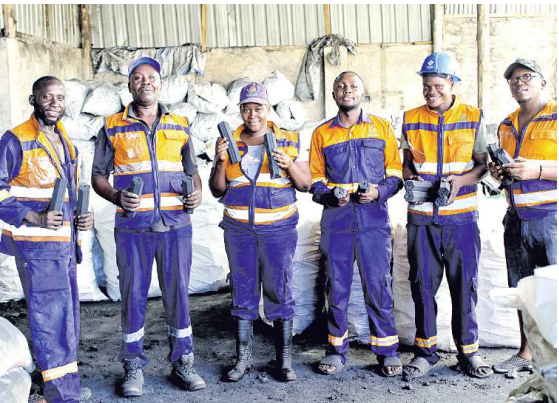

In Utange, a coastal town in Mombasa county, a group of enterprising young people demonstrates how environmental sustainability can be the foundation of economic growth.
In 2018, John Githaiga and his friends established the Natural Char Energy community-based organisation.
The CBO became the pioneer in making charcoal briquettes using coconut shells.
Briquettes are energy products that not only provide clean energy but are also efficient.
What began as a small community initiative has since gained international traction, thanks to the support of the Kenya Marine Fisheries and Socio-Economic Development (KEMFSED) project.
The group, which is made up of 32 members; 11 men and 21 women, supplies the eco-friendly briquettes to hotels, institutions and markets abroad, including Saudi Arabia.
“We founded Natural Char Energy to provide affordable and cleaner energy source. Our product, made from carbonised coconut shells, burns longer and produces less smoke than traditional charcoal,” Githaiga said.
THE PROCESS
Making charcoal briquettes is meticulous.
The process involves multiple steps to ensure each briquette is of high quality, durable and environmentally friendly. ‘
“We start by carbonising the coconut shells to create char. Then, we sort the char to remove any foreign particles. Once sorted, we crush the material into finer particles to achieve the texture we need for our briquettes” he said.
Carbonised coconut shell powder is mixed with water and cassava flour, a locally sourced binder that gives the briquettes their cohesive strength.
The mixture is then compressed into shapes — cylindrical, hexagonal or cubic —using moulds.
“We use cassava fl our because it’s abundant and provides the right bonding ingredients for the briquettes,” Githaiga said
The flour also ensures each briquette maintains its form during burning.
Once moulded, the briquettes are dried using a solar dryer — a facility acquired through KEMFSED’s support and has drastically improved efficiency of the drying process.
The final step is packaging.
Once dried, the briquettes are packed and ready for distribution.
“Our briquettes are affordable and burn longer than traditional charcoal, so they’re ideal for households, hotels, schools and other institutions,” Githaiga said.
The Saudi Arabian client regularly orders 25 tonnes of briquettes — enough to fill a 40-foot container.
For Mishi Mweri, a worker at Natural Char Energy, the project has transformed her life.
“Before joining the group, I was facing many financial difficulties. I couldn’t afford school fees and struggled to make ends meet,” she said.
Mweri said the job has brought her and her family financial freedom.
“Now, I earn a steady income, which allows me to pay fees for my children and support myself. The briquettes are also very useful — I use them at home and they cook food so well, with little to no smoke. They’re healthier, especially for women who spend long hours cooking,” she said.
The market and increased production have allowed more people to join the group, resulting in more jobs and a stronger community bond.
Many members, who initially relied on community donations to meet basic needs, now earn enough to support their families.
Despite the impressive growth, Natural Char Energy faces some challenges.
One significant hurdle is working capital, as some hotels and institutions take up to 90 days to settle payments.
“Running a business on delayed payments can be difficult, so we need more working capital to manage our daily operations without interruptions,” Githaiga said.
Another challenge is changing perceptions.
Many residents assume the briquettes, because of their high-quality packaging, are exclusively for export.
However, at a price of Sh30 per kg — half the price of traditional charcoal — the organisation’s briquettes are affordable and a great value.
“We are working to create more awareness about our product’s affordability and benefits. Once people try it, they will see that it’s cheaper and cleaner than traditional charcoal,” Githaiga said.
Meanwhile, Natural Char Energy has transformed from a modest startup to a successful business that not only creates jobs but also promotes sustainable energy practices across Mombasa.
The success of the organisation is due to the support of the Sh2.6 million grant it received from KEMFSED, which focuses on stimulating sustainable socioeconomic development in coastal communities.
Recognising the potential of this environmentally friendly enterprise, KEMFSED provided funding that allowed Natural Char Energy to upgrade its facilities and purchase essential equipment.
Samuel Okech, KEMFSED’s environmental safeguards officer for Mombasa county, emphasises the importance of supporting grassroots initiatives.
“Our goal at KEMFSED is to empower communities to address environmental issues and stimulate economic growth. By investing in projects such as Natural Char Energy, we’re encouraging sustainable practices that can uplift communities,” he said.
Apart from providing a solar dryer, KEMFSED also helped the organisation to set up working sheds.
“We also facilitated the purchase of a new machine, allowing them to increase production capacity from one tonne to 1.5 tonnes per day,” Okech said.
“Many communities along Kenya’s coastal strip have not had equal economic opportunities due to various challenges, including limited access to sustainable development resources. Our focus is to address this by financing initiatives that promote energy sustainability, which not only stimulates the economy but also aligns with Kenya’s commitment to addressing climate change and environmental degradation.”
“By investing in local enterprises,
we are not only promoting environmental sustainability but also providing young people with a viable
career path,” Okech said.











